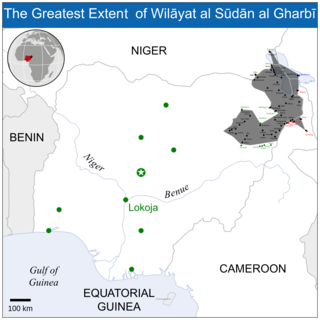| |||||
| Decades: | |||||
|---|---|---|---|---|---|
| See also: | |||||

The following lists events that happened during 2014 in Niger .
| |||||
| Decades: | |||||
|---|---|---|---|---|---|
| See also: | |||||

The following lists events that happened during 2014 in Niger .

Goodluck Ebele Azikiwe Jonathan is a Nigerian politician who served as the president of Nigeria from 2010 to 2015. He lost the 2015 presidential election to former military head of state General Muhammadu Buhari and was the first incumbent president in Nigerian history to concede defeat in an election, thus allowing for a peaceful transition of power.

Boko Haram, officially known as Jamā'at Ahl as-Sunnah lid-Da'wah wa'l-Jihād, is an Islamist terrorist jihadist organization based in northeastern Nigeria, which is also active in Chad, Niger, northern Cameroon, and Mali. In 2016, the group split, resulting in the emergence of a hostile faction known as the Islamic State's West Africa Province.

Gwoza is a local government area of Borno State, Nigeria. Its headquarters are in the town of Gwoza, a border town "about 135 kilometres South-East of Maiduguri." The postal code of the area is 610.

The Boko Haram insurgency began in July 2009, when the militant Islamist and jihadist rebel group Boko Haram started an armed rebellion against the government of Nigeria. The conflict is taking place within the context of long-standing issues of religious violence between Nigeria's Muslim and Christian communities, and the insurgents' ultimate aim is to establish an Islamic state in the region.

Abubakar Mohammed Shekau was a Nigerian militant who was the leader of Boko Haram, an Islamist extremist organization based in northeastern Nigeria, from 2009 to 2021. He served as deputy leader to the group's founder, Mohammed Yusuf, until Yusuf's execution in 2009.

The Vanguard for the Protection of Muslims in Black Africa, better known as Ansaru and less commonly called al-Qaeda in the Lands Beyond the Sahel, is an Islamic fundamentalist Jihadist militant organisation originally based in the northeast of Nigeria. Originally a faction of Boko Haram, the group announced in 2012 that it had pledged allegiance to al-Qaeda and was independent. Despite this, Ansaru and other Boko Haram factions continued to work closely together until the former increasingly declined and stopped its insurgent activities in 2013. The group was revived in 2020, and has been involved in the Nigerian bandit conflict.
Timeline of the Boko Haram insurgency is the chronology of the Boko Haram insurgency, an ongoing armed conflict between Nigerian Islamist group Boko Haram and the Nigerian government. Boko Haram have carried out many attacks against the military, police and civilians since 2009, mostly in Nigeria. The low-intensity conflict is centred on Borno State. It peaked in the mid-2010s, when Boko Haram extended their insurgency into Cameroon, Chad and Niger.
The following lists events from 2014 in Nigeria.
The following lists events that happened during 2014 in Cameroon.
The following lists events that happened during 2015 in Nigeria.
The following lists events that happened during 2015 in Chad.
The following lists events that happened during 2015 in Niger.

The Islamic State's West Africa Province (ISWAP), officially Wilāyat Garb Ifrīqīyā, meaning "West African Province", is a militant group and administrative division of the Islamic State (IS), a Salafi jihadist militant group and unrecognised quasi-state. ISWAP is primarily active in the Chad Basin, and fights an extensive insurgency against the states of Nigeria, Cameroon, Chad, Niger and Turkey. It is an offshoot of Boko Haram with which it has a violent rivalry; Boko Haram leader Abubakar Shekau killed himself in battle with ISWAP in 2021. Until March 2022, ISWAP acted as an umbrella organization for all IS factions in West Africa including the Islamic State in the Greater Sahara (IS-GS), although the actual ties between ISWAP and IS-GS were limited.

Starting in late January 2015, a coalition of West African troops launched an offensive against the Boko Haram insurgents in Nigeria.

The Chad Basin campaign of 2018–2020 was a series of battles and offensives in the southern Chad Basin, particularly northeastern Nigeria, which took place amid the ongoing Boko Haram insurgency. The Chad Basin witnessed an upsurge of insurgent activity from early November 2018, as rebels belonging to the Islamic State's West Africa Province (ISWAP) and Boko Haram launched offensives and several raids to regain military strength and seize territory in a renewed attempt to establish an Islamic state in the region. These attacks, especially those by ISWAP, met with considerable success and resulted in the displacement of hundreds of thousands of civilians. The member states of the Multinational Joint Task Force (MJTF), namely Nigeria, Niger, Chad, and Cameroon responded to the increased insurgent activity with counter-offensives. These operations repulsed the rebels in many areas but failed to fully contain the insurgency.
The Damasak massacre was a series of massacres and mass execution committed by Boko Haram in the city of Damasak, Nigeria.
In May 2021, the Islamic State's West Africa Province (ISWAP) launched an invasion of the Sambisa Forest in Borno State, Nigeria, which was serving as the main base of Boko Haram, a rival jihadist rebel group. Following heavy fighting, ISWAP overran the Boko Haram troops, cornering their leader Abubakar Shekau. The two sides entered negotiations about Boko Haram's surrender during which Shekau committed suicide, possibly detonating himself with a suicide vest. Shekau's death was regarded as a major event by outside observers, as he had been one of the main driving forces in the Islamist insurgency in Nigeria and neighboring countries since 2009.